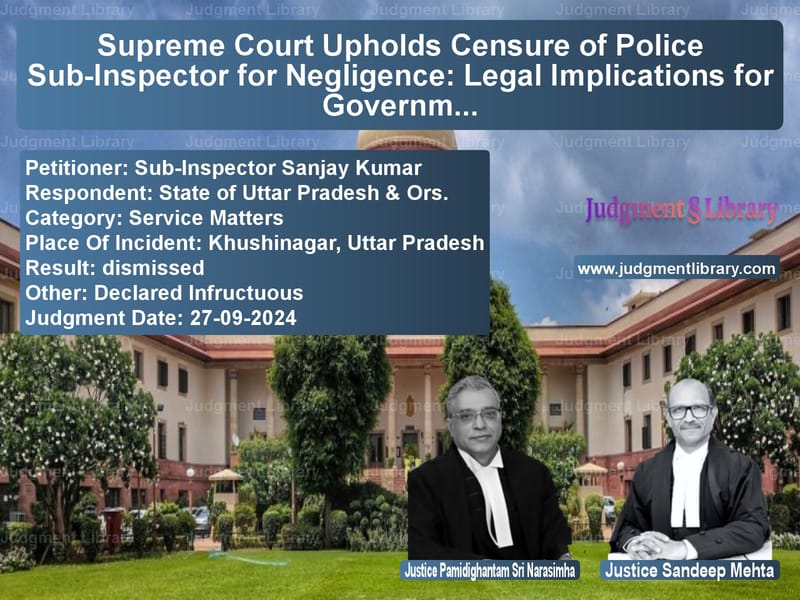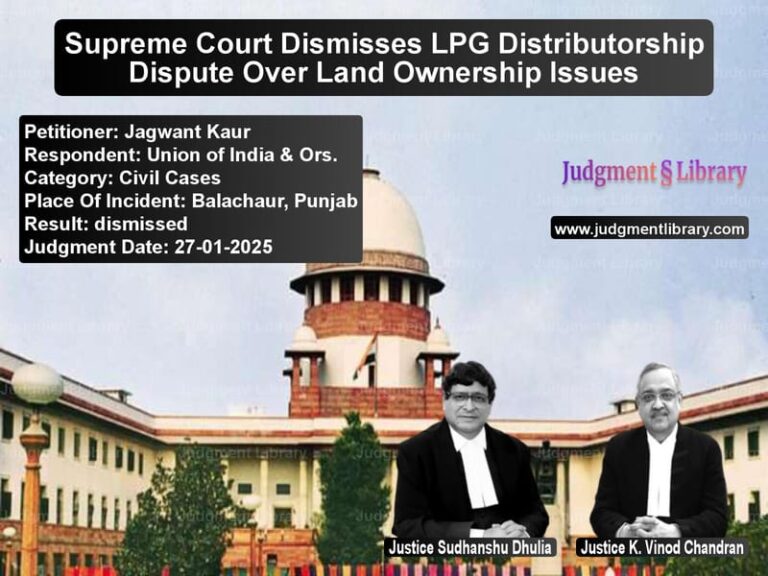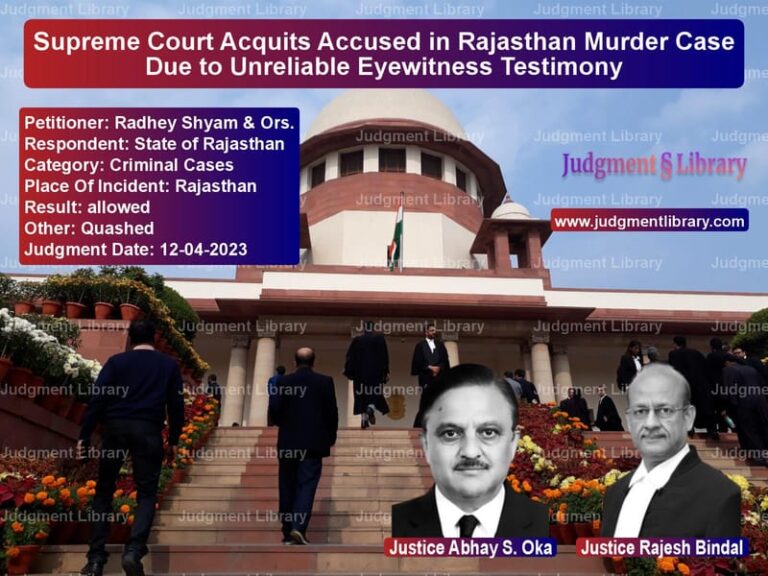Supreme Court Upholds Censure of Police Sub-Inspector for Negligence: Legal Implications for Government Employees
The case of Sub-Inspector Sanjay Kumar vs. State of Uttar Pradesh & Ors. is a significant ruling on disciplinary actions against police officers for inefficiency and negligence in duty. The Supreme Court upheld the censure issued to the appellant, reinforcing the importance of accountability in government service. The judgment clarifies that disciplinary authorities have the power to issue censure entries as a minor penalty under the Uttar Pradesh Police Officers of the Subordinate Ranks (Punishment and Appeal) Rules, 1991, provided due process is followed.
The ruling also highlights that censure is not a major penalty but serves as a corrective measure to ensure better performance by officers in public service. The case establishes that officers failing to meet expected standards in their duties, particularly in law enforcement, may face disciplinary actions, including warnings, censure, and other service penalties.
Background of the Case
The appellant, Sub-Inspector Sanjay Kumar, was serving at Police Station Hanumanganj, District Khushinagar, Uttar Pradesh. He was among the officers listed for inefficiency in investigating and closing cases within a reasonable timeframe. As a result, the Uttar Pradesh government initiated disciplinary action against him based on reports indicating a backlog of pending cases.
Key developments in the case:
- September 9, 2021: The Chief Minister of Uttar Pradesh, during a review meeting, identified 12 districts with the lowest disposal rates of criminal cases.
- September 25, 2021: The Additional Director General of Police (Crime) prepared a report highlighting investigating officers with pending cases and issued a show-cause notice to the appellant.
- November 16, 2021: The Additional Chief Secretary, Home (Police), issued an order censuring the appellant for negligence in duty.
- March 7, 2022: The Superintendent of Police of Khushinagar formally recorded the censure in the appellant’s service records.
- August 5, 2022: The appellant challenged the censure order in the Allahabad High Court.
- December 14, 2022: The High Court dismissed the appellant’s plea, affirming that the censure order was issued in compliance with the 1991 Rules.
- September 27, 2024: The Supreme Court upheld the High Court’s ruling, dismissing the appellant’s appeal.
Legal Arguments
Arguments by the Appellant (Sub-Inspector Sanjay Kumar)
- The censure was issued without giving him an opportunity to defend himself, violating the principles of natural justice.
- The action was contrary to the Uttar Pradesh Police Officers of the Subordinate Ranks (Punishment and Appeal) Rules, 1991, which require a fair inquiry before imposing penalties.
- The High Court failed to consider that he was not given any formal hearing before the punishment was imposed.
- The decision was arbitrary, as no individual assessment was made regarding his pending cases.
- The punishment of censure negatively impacts his career, affecting promotions and further service prospects.
Arguments by the Respondents (State of Uttar Pradesh)
- The censure was issued after due process, and the officer had been given an opportunity to explain his poor performance.
- A show-cause notice was issued on September 25, 2021, and the appellant had submitted a reply, which was found unsatisfactory.
- The penalty of censure is a minor penalty under Rule 4(1)(b) of the 1991 Rules and does not require full-fledged disciplinary proceedings.
- The Superintendent of Police was fully authorized under Rule 7(2) to issue such a penalty.
- The government has a duty to maintain efficiency in policing, and leniency towards inefficient officers would harm public interest.
Supreme Court’s Observations
1. Was the Censure Order Issued Without Following Due Process?
The Court examined Rule 14(2) of the 1991 Rules, which states that minor penalties such as censure can be imposed after informing the officer in writing and providing an opportunity to respond.
“The appellant was duly notified through official communication and was given an opportunity to respond, fulfilling the procedural requirements.”
2. Did the High Court Err in Dismissing the Appellant’s Plea?
The Supreme Court ruled that the Allahabad High Court had correctly dismissed the appellant’s writ petition and intra-court appeal, as the action against him was legally justified.
“The High Court committed no error in rejecting the appellant’s challenge, as the action was in accordance with the applicable service rules.”
3. Can Performance-Based Censure Be Considered Punitive?
The Court emphasized that censure is a corrective measure and not a major punishment. It is used to ensure efficiency and discipline among officers.
“Censure does not lead to dismissal, removal, or suspension but serves as a formal warning to improve conduct.”
4. Impact of Censure on Service Records
The Court acknowledged that while censure does not directly result in loss of employment, it does affect service progression and career prospects.
“A censure entry in service records is a mark of inefficiency, and repeated entries can impact promotions and career advancement.”
Final Verdict
The Supreme Court issued the following orders:
- The appeal was dismissed, and the censure entry remained valid.
- The ruling of the Allahabad High Court was upheld.
- The appellant’s challenge to the punishment was found to be without merit.
- The disciplinary authorities were directed to continue ensuring accountability among law enforcement personnel.
This ruling reinforces the accountability of police officers and clarifies the procedural requirements for imposing minor penalties.
Petitioner Name: Sub-Inspector Sanjay Kumar.Respondent Name: State of Uttar Pradesh & Ors..Judgment By: Justice Pamidighantam Sri Narasimha, Justice Sandeep Mehta.Place Of Incident: Khushinagar, Uttar Pradesh.Judgment Date: 27-09-2024.
Don’t miss out on the full details! Download the complete judgment in PDF format below and gain valuable insights instantly!
Download Judgment: sub-inspector-sanjay-vs-state-of-uttar-prade-supreme-court-of-india-judgment-dated-27-09-2024.pdf
Directly Download Judgment: Directly download this Judgment
See all petitions in Disciplinary Proceedings
See all petitions in Public Sector Employees
See all petitions in Termination Cases
See all petitions in Judgment by P.S. Narasimha
See all petitions in Judgment by Sandeep Mehta
See all petitions in dismissed
See all petitions in Declared Infructuous
See all petitions in supreme court of India judgments September 2024
See all petitions in 2024 judgments
See all posts in Service Matters Category
See all allowed petitions in Service Matters Category
See all Dismissed petitions in Service Matters Category
See all partially allowed petitions in Service Matters Category







